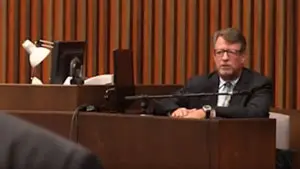

The Expert: Dr. Kalman Blumberg, an orthopedic surgeon based in Florida, testifies regarding the standard of care in treating a hematoma similar to the one suffered by the plaintiff.

During a 2017 medical malpractice trial, an orthopedic surgeon, Dr. Kalman Blumberg, plainly defines the standard of care in treating a neck hematoma, and he convincingly details multiple occasions in which he believes a hospital’s treatment breached that standard.
The case involves a woman who had undergone spinal surgery in her neck, and several days later developed a hematoma that put so much pressure on her trachea that she eventually suffered respiratory failure. Blumberg’s testimony helped persuade the jury that there had been a series of breaches that delayed timely care of a serious, but definitely treatable complication. This delay allowed worsening of her symptoms until her ultimate respiratory collapse.
Timing played a key role in the case. The plaintiff arrived at the hospital’s emergency room at around 3:00 AM with difficulty breathing and swallowing. Neck X-rays showed swelling and a blood clot within her neck at the surgical site, which had shifted the trachea into an abnormal position.
The hospital staff physician designated to oversee the plaintiff’s care ordered a CT scan of her neck at 5:30 AM. Blumberg explains this test is superfluous under the circumstances, but that he would not consider it to be wrong, “as long as she was on her way to the operating room.” He tells jurors he believes that there was already enough evidence to explore the patient and evacuate the hematoma. Since she would require exploration regardless of the CT findings, it would only make sense to obtain the additional imaging if the delay the test required matched the time it took for the operating room to prepare for treatment.
However, the ER nurse that received the doctor’s order for a CT allegedly failed to enter that order into the hospital’s computer system. This, Blumberg concludes, resulted in the CT not being performed in a timely fashion, and was a breach by that nurse. If the CT had been performed when ordered and promptly interpreted, Blumberg tells jurors, “the CT scan should have made a reasonable and prudent surgeon… protect her airway.”
In addition, the expert says that the standard of care required the doctor to review the neck films taken in the ER, because they are an important part of the evidence he would need when deciding on quick surgical intervention. There was no objective evidence the doctor had reviewed the films, however, and Blumberg concludes this appears to be a breach that contributed to the plaintiff’s poor eventual outcome.
The testimony then turns to the contention that this patient arrived at the hospital with a problem critical enough to be admitted to the ICU, but her treating physician did not see her for at least 5 hours. Blumberg stresses that, with this particular surgical complication, the physician’s evaluation is imperative in deciding on the need for immediate surgery. Such an evaluation and decision should not be left to nurses or other ancillary personnel, Blumberg maintains.
The plaintiff’s attorney enters into evidence a hospital rule stating that a physician admitting a patient to the ICU must see that patient within 2 hours of the ICU admission, a rule the hospital’s physician seemed to have breached with the 5-hour delay. But Blumberg goes farther, insisting that the rule is irrelevant in this case since delaying evaluation by even that amount of time inappropriately and inordinately delays the treatment of a patient under these circumstances.
The hospital physician previously stated that he looked for the plaintiff when he arrived at the hospital, but could not find her, so he went on to see other patients. Blumberg responds to that explanation with disbelief. “I mean, she’s in a hospital,” Blumberg says, adding that the plaintiff could only be in one of three places: the ER, the ICU, or traveling in between the two. If she was not in the ER, the doctor could have waited in the ICU for her to arrive. The timely evaluation was that important.
Once the plaintiff had been admitted to the ICU, she complained to the nurse that she had difficulty breathing when she became anxious. But the nurse did not report this to the treating physician for at least 90 minutes. Blumberg states this was another breach of the standard of care, and it deprived the doctor of important information that he may have acted upon more quickly. Moreover, the deterioration of the patient’s vital signs indicated an impending disaster that appears to have been ignored. The testifying expert likens this to “a ticking time bomb.” He explains that “When this bomb goes off… her brain will suffer damage,” from lack of oxygen.
The testimony then details evidence showing that, at 9:48 AM, a nurse contacts the treating doctor regarding the CT, more than 4 hours after it was ordered. Blumberg reiterates that waiting on the CT was unnecessary and unwise given the information already available, but if the doctor insisted on a CT, it should have been ordered “stat” to assure its quick performance and review. In this case, however, Blumberg says it is unlikely the physician issued a “stat” order.
The jury was obviously impressed with Blumberg’s no-nonsense testimony, and rendered a $26 million verdict for the plaintiff.
Gary Gansar, MD, is residency-trained in general surgery. He served as Chief of Surgery and Staff at Elmwood Medical Center and on the Medical Executive Committee at Touro Infirmary and Mercy Hospital in New Orleans, LA. Dr. Gansar was Board Certified in general surgery while in active practice. He joined AMFS in 2015 as a Physician Medical Director.
The medical expert witness partner for attorneys serious about building a winning case
AMFS is your trusted source for highly-qualified medical expert witnesses. After pioneering the field nearly three decades ago, we’re continuing to redefine medical expert witness services by providing value far beyond a referral alone.
Our Physician Medical Directors know what it takes to build a strong case. Our medical expert witnesses leave no doubt. And our case managers streamline billing and logistics every step of the way, letting you focus on what you do best: constructing your winning case. Explore why AMFS clients expect more from their medical expert witnesses—and get it.
